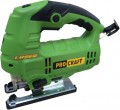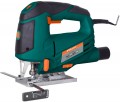Power consumption
The maximum electrical power consumed by the jigsaw during operation. It is worth noting that this parameter uniquely determines only the amount of electricity spent on the operation of the tool; its practical characteristics, for example, the thickness of the material and the speed of operation, depend primarily on the output power (see below). On the other hand, the output power is not always indicated by the manufacturer, and therefore a comparison by power consumption is quite acceptable — to a certain extent, it allows you to evaluate the characteristics of the tool. So, it is believed that electric jigsaws up to 600 W are enough for domestic use, and
more powerful models belong to the professional segment. For more information on selecting a jigsaw for power, see "Output Power".
Minimum frequency
The minimum stroke frequency of the jigsaw blade during operation. In some cases (for example, when working on metal), a low stroke rate is preferable to a high one; accordingly, the lower the minimum frequency, the more opportunities you will have to set up the instrument for working on a particular material.
Wood
Maximum cutting depth in wood, in other words — the maximum thickness of a wooden workpiece that a jigsaw can handle. This parameter characterizes not only directly the maximum thickness of the material, but also the performance of the tool as a whole: the greater the depth of cut, the higher the performance. In the case of wood for domestic use, a depth of about 70 mm is considered sufficient, deeper models are usually professional.
It is worth noting that the depth of cut is usually indicated for certain files recommended by the manufacturer for a particular material. The use of other canvases does not guarantee compliance with the claimed parameters, and in some cases it is even fraught with breakdowns and injuries.
Steel
The maximum depth of cut in steel, in fact, is the maximum thickness of a workpiece made of steel or other metal of similar characteristics that a jigsaw can handle. For more information about the depth of cut, see "Wood", here we note that due to the hardness of the material, even in professional models, this parameter rarely exceeds 10 mm.

